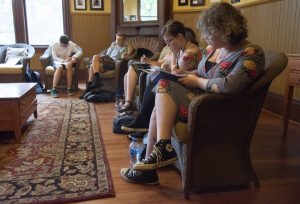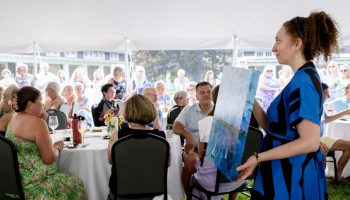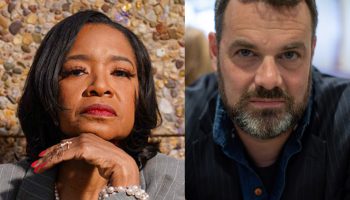
Last week, young writers gathered on the second floor of the Literary Arts Center at Alumni Hall and learned that, in certain instances, it might be OK to cheat.
Under the tutelage of Kim Henderson, a returning faculty member for Chautauqua’s Young Writers Institute, the students explored the abecedarian, a poetic form structured according to alphabetical order. Usually, each line or stanza begins with each letter of the alphabet — a feat that gets trickier as poets approach letters like “Q” and “Z.”
“I did have to cheat with (the word) ‘extremities,’ ” one student admitted.
“I think with ‘X’ that’s allowed,” Henderson said.
Encompassing two five-day writing camps for students ages 14 to 18, YWI has wrapped its second and final week of the 2019 season. Henderson, author of The Kind of Girl and chair of the Creative Writing program at Idyllwild Arts Academy, and Kenyatta Rogers, a Cave Canem Fellow and creative writing faculty at the Chicago High School for the Arts, both returned during Weeks Three and Four to teach at the YWI in its second year.
Billed as a “multi-genre” writing experience for high school students, the curriculum Henderson and Rogers implemented covers fiction, poetry and nonfiction. Henderson reserved Monday and Tuesday of Week Three for the essential elements of fiction — character development, dialogue, setting, plot and “lots of sensory detail discussion” — and moved into free verse poetry on the following day.
July 11, the day of the abecedarian and the fickle “X,” was devoted to poetic forms with a pause to attend Elizabeth Rush’s Chautauqua Literary and Scientific Circle Author Presentation on her book Rising: Dispatches from the New American Shore. On her cohort’s final day, the students delved into nonfiction while also wrapping up pieces, receiving feedback and creating a class chapbook.
Although Henderson described this year’s young writers as “generally younger,” she appreciated the blend of those who are “trying something new” and those who “seem pretty serious about (writing).” During the fiction portion of the week, Henderson remembered how students reacted to the short story “Orientation” by Daniel Orozco, written in the second-person.
“I really enjoy seeing students kind of blown away by something that they read, and this particular story had that effect,” Henderson said. “That was exciting.”
In addition to providing the opportunity to attend lectures and Brown Bag craft talks, Chautauqua yielded inspiration in other unlikely ways. Walking by the dining room in Alumni Hall, Henderson saw the overflow of stuff to be sold at July 14’s Silent Auction — the event that raises capital earmarked to facilitate the all-expenses paid YWI scholarships for teacher-recommended Chautauqua County students. As an improvised exercise, Henderson took her students to the space and had them craft a story about a found treasure.
Rogers, too, expanded his classroom out from the designated YWI room at Alumni Hall. On Monday, he and his Week Four cohort toured the Fowler-Kellogg Art Center and wrote an ekphrastic work after a discussion about the meaning and measurement of art, including a reading of “Enlightenment” by Natasha Trethewey. On Tuesday, when they were reading a piece set in the 1950s on Bestor Plaza, the class encountered a group of kazoo players and the newsies hawking issues of The Chautauquan Daily.
“I thought, ‘(this time period) is really enacting itself right now,’ ” Rogers said.
Armed with a background in poetry, Rogers created a more interdisciplinary curriculum with an emphasis on thinking deeply about language through word games and prompts. He hoped, by the end of the week, to see growth in student confidence.
“(In the beginning), no one really wants to share anything,” he said. “I hope that they learn it’s OK to be different, and it’s OK to have your own perception of things and to write about those things. I want to build a community, even if it’s very, very small. Because that helps people with their art.”
Atom Atkinson, director of literary arts, said that this year the YWI participant demographic is “perfectly balanced” between scholarship recipients and young writers on the grounds with their families.
Arianna Taylor, 15, is a student at Southwestern High School and one such scholarship recipient. She prefers poetry — Charles Bukowski is her favorite — but dabbles in prose; during her week at Chautauqua, she wrote a prose piece based on the tabloid headline “Man gets rushed to the emergency room when coins burn holes in his pocket,” as well as a poem titled “Crave.”
When Chloe Smith, 17, wasn’t busy discovering that poetry “isn’t quite as hard” as she thought, or writing a short story that she hopes to expand into a book, she was navigating a packed schedule of Week Three extracurricular events: a piano recital, two orchestra concerts, Chautauqua Theater Company’s The Christians, a ballet and the Opera Invasion “Opera Open Book” on Odland Plaza.
“I’ve done more things here in one week than I’ve ever thought I would,” said Smith, also a scholarship recipient. “I wouldn’t be able to do as much without my amazing host family.”
Leaving YWI and returning to Westfield Academy and Central School in the fall, Smith wants to use more uncommon similes and metaphors to make her creative work stand out.
“In English class, we learn how to write some creative writing, but it’s mostly learning how to write a paper for school so that we’re prepared for college,” she said. “I just think that this is such an amazing program, and I wouldn’t have even heard about it if a girl from my school hadn’t gone last year and the school newspaper wrote a little piece about it. Otherwise I wouldn’t have even known.”
Taylor’s scholarship made her feel like she “earned” her place.
“That gives me a lot of pride that I don’t always get in terms of my (high school) English class,” she said.
After experiencing the scholarly atmosphere on the grounds, Taylor said she is grateful to her host family — “some of the nicest people” she’s ever met — and sees a tangible improvement in her writing.
“I’m so proud of the poems and prose I’ve written here, and I’m really excited to get back and show my mother,” she said.




